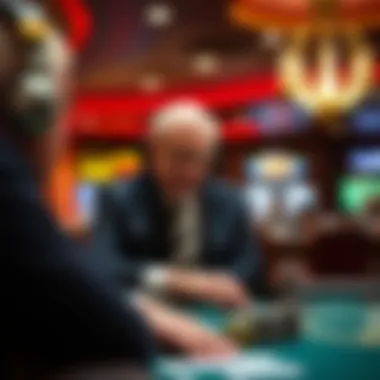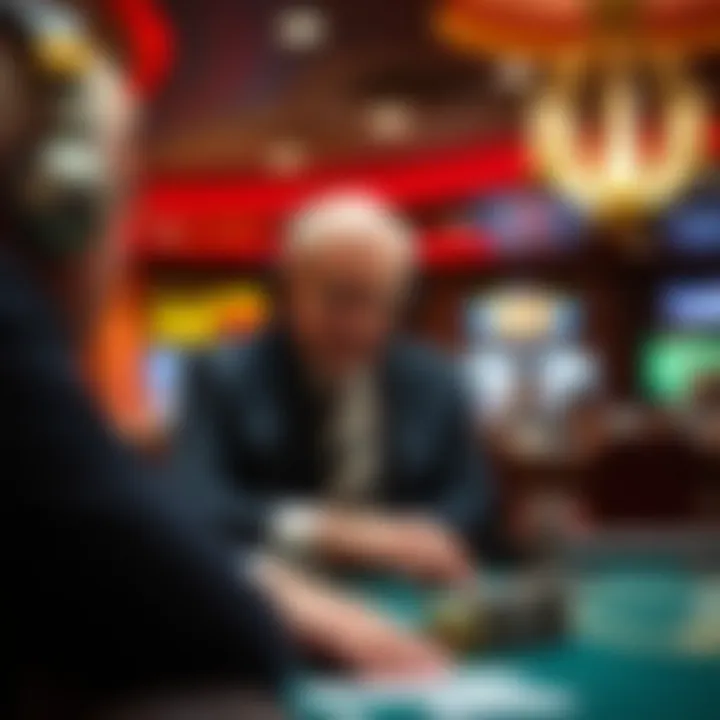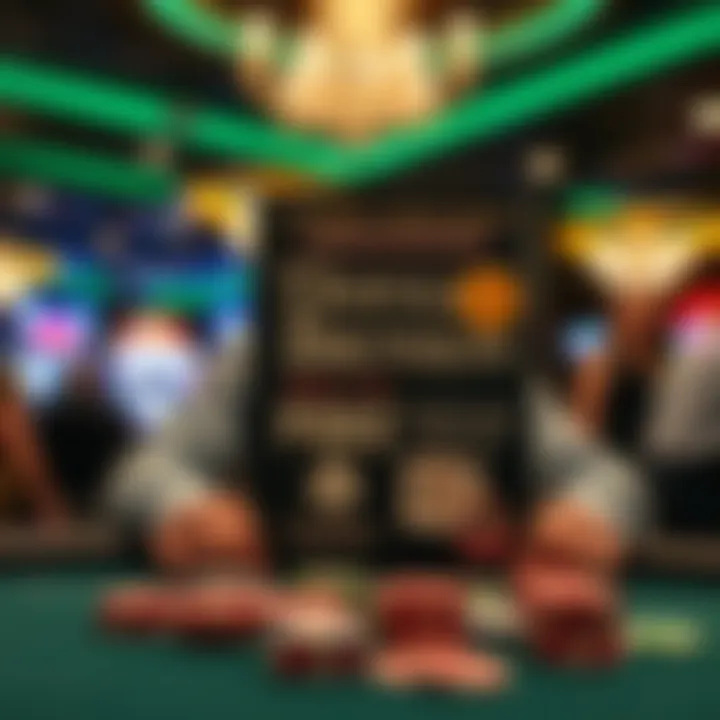Insights from Doyle Brunson's Audiobook on Poker


Intro
Doyle Brunson, a name that resonates deeply within poker circles, brings forth a wealth of knowledge and experiences in his audiobook. This form of storytelling transcends mere instruction; it captures the essence of a lifetime dedicated to mastering the art of poker. Brunson’s narrative showcases the allure of poker, intertwining personal anecdotes with practical wisdom, making it accessible for all, from neophytes to seasoned pros.
In this exploration, we aim to unpack the wisdom contained within Brunson’s audiobook, shedding light on his significant contributions to the game. It isn’t just about the rules or strategies; it’s about understanding the psychological undertones that govern play and the drive to triumph amidst competition. These pivotal insights can usher novice players into the world of poker while also providing seasoned players a fresh perspective on their game.
Through a careful analysis of the themes and lessons extracted from the audiobook, this piece will serve as both a guide and a resource. We’ll delve into the core elements that celebrate Brunson's illustrious legacy, as well as reflect on how these insights can be imperative for poker enthusiasts today.
Let’s embark on this journey of understanding what makes Doyle Brunson a revered figure in gambling—one word, one hand, and one story at a time.
Prologue to Doyle Brunson
Doyle Brunson's name is woven into the very fabric of poker history. As an iconic figure in the world of cards, he has transformed the game from a pastime into a professional sport. This introduction serves as an essential backdrop for understanding the significance of his audiobook. Brunson’s contributions transcend mere winning—he’s shaped strategies, influenced countless players, and left an indelible mark on poker culture.
Overview of Brunson's Career
Doyle Brunson's career is the stuff of legends. Starting from the dusty streets of Longworth, Texas and growing into a world-renowned poker player, his journey has been nothing short of remarkable. With a career that spans over five decades, Brunson has amassed ten World Series of Poker bracelets, a feat that reflects his unparalleled skills and strategic prowess.
His early years were not cushy; he faced hardships, including a serious injury that derailed his basketball aspirations. Instead of crumbling, Brunson turned to poker, a decision that would eventually establish him as a titan in the industry. He published the game-changing book "Super/System" in 1978, which opened up the world of poker strategy to the masses. This was an era where information was scarce, and Brunson's insights helped lay the groundwork for modern poker strategies.
Moreover, the evolution of Texas Hold'em can often be traced back to Brunson’s influence. A style that combines technical skill with psychological understanding, his methods resonate with both seasoned players and rookies alike. Through his audiovisual work, including this audiobook, he continues to impart wisdom to aspiring poker enthusiasts and illuminate the nuances of gameplay.
Legacy in Poker Culture
Doyle Brunson's legacy in poker is profound. Not only has he been instrumental in popularizing Texas Hold'em, but his charismatic personality and sportsmanship have made him a beloved figure among fans and fellow players. His rules of the game are not just confined to the physical table; they extend into the broader horizons of poker culture.
Players look to him for guidance, and his stories offer a glimpse into the evolution of the game itself. Stories about high-stakes matches and encounters with other poker greats offer richness to the poker community. They serve as lessons not just about strategy, but also about the human element of poker, which is often lost in analytical discussions.
Brunson's work, including this audiobook, explores not just the mechanics of poker, but its heart. His influence has encouraged new generations to take up the game and engage with its complexities, turning novices into competitors, and competitors into champions. His teachings resonate beyond the table, reaching into the psychology of competition, risk assessment, and decision-making that players apply in various aspects of life.
"Poker is a battle of wits, a mental duel against one’s opponent. Strategy alone won't win; understanding the psychology behind the game can make all the difference."
Understanding the Audiobook Format
The audiobook format has seen a meteoric rise in popularity. This trend is particularly relevant when digging into Doyle Brunson's audiobook. It provides not just a way to absorb Brunson’s rich insights into poker but reshapes how lessons are delivered in today’s digital age.
Listening, as opposed to reading, can enhance comprehension by allowing listeners to engage with the material more openly. In the context of poker, where strategy and psychological nuances matter, the audiobook format breathes life into Brunson's teachings, making them more relatable. The sonic nature of this medium can catch subtleties that may otherwise go unnoticed on a written page.
Benefits of Audiobooks for Learners
Audiobooks convey lessons in a way that caters to varied learning styles. Here are a few benefits that stand out:
- Engagement: The narrative voice can infuse energy into the lessons. Great storytellers like Brunson have a distinctive way of recounting experiences that draws listeners in.
- Multitasking: Learners can digest poker strategies while on the go. Whether commuting or working out, the flexibility allows players to integrate learning into their busy lives.
- Retention: Listening can enhance memory recall. The human mind is wired to remember stories and dialogues better than static text.
By blending the compelling saga of Brunson's life with critical strategic lessons, the audiobook format makes it easier for both amateur and seasoned players to absorb information.
Accessibility and Convenience
Accessibility stands tall as one of the most attractive features of audiobooks. With various options like Audible, Google Play Books, and even local libraries offering digital platforms, learners of all backgrounds can access Brunson's wisdom.
- Device Compatibility: Whether someone prefers a smartphone, tablet, or computer, the audiobook can be enjoyed nearly anywhere. This adaptability is a boon for users who might not have the time to sit down with a physical book.
- Diverse Content: Audiobooks often come with added features, like playback speed options and chapter navigation, making it easy to revisit certain sections where crucial strategies are discussed.
- Global Reach: For non-native English speakers or those with vision impairments, a well-narrated audiobook can break barriers, making high-level poker strategies accessible to a broader audience.
Ultimately, the audiobook format transforms Brunson’s theories into an engaging experience that feels personal. It’s not just about learning the ropes but embarking on a journey through the highs and lows of poker, narrated by a true legend.
Content Breakdown of the Audiobook
Doyle Brunson's audiobook serves as a rich tapestry woven with the threads of strategy, mindset, and personal stories from one of poker's most influential figures. It's crucial to delve into the content because it doesn't merely offer a collection of tips, but rather an empirical exploration of the complexities behind the game. Listeners are not just absorbing information; they're immersing themselves in the poker culture that Brunson so profoundly shaped. Through this breakdown, aspiring players and seasoned veterans alike can gain valuable insights that enhance their understanding and approach to the game.


Key Themes Discussed
Strategy and Tactics
The strategic elements of poker are like the heart of the game. Brunson emphasizes the importance of developing a solid foundation in tactics. This aspect isn't just about knowing when to fold or bet; it encompasses a broader understanding of game dynamics. One of the key characteristics of effective strategy involves being adaptable. In his audiobook, Brunson illustrates this through relatable examples that show how the best players modify their plays based on shifting circumstances at the table. This adaptability speaks volumes about the high-stakes nature of the game.
The unique feature of this segment is how Brunson marries practical examples with theoretical concepts. Listeners learn that while intuition plays a role, the backbone of any solid strategy is a keen understanding of probabilities and opponent tendencies. The advantage? Players can tailor their strategies, leading them to make informed decisions rather than relying on gut feelings alone.
Mindset and Psychology
When it comes to mindset and psychology, Brunson dives deep into the mental fortitude required to excel in poker. One of the compelling aspects is the acknowledgment of emotional control, which he articulates through his own experiences. He argues that how one reads their opponents is equally as important as the cards being played. Many players overlook this, yet Brunson candidly reveals how a player’s demeanor can be a tell-tale sign of their hand strength.
This focus on psychology is beneficial as it offers insight into the often-overlooked aspect of self-awareness. By fostering a strong mindset, players can navigate not only the highs and lows of their game but also enhance their decision-making skills. The mental edge often separates amateurs from professionals, showing that poker isn't just a game of cards, but a mind game.
Risk Management
In poker, risk management is paramount. Brunson addresses this by breaking down how calculated risks can lead to significant rewards. He emphasizes the need to evaluate not just the potential gains but the potential losses as well. The attentive listener will realize that understanding risk-reward ratios allows a player to navigate more successfully through turbulent table dynamics.
The notable characteristic here is the distinction between reckless gambling and well-considered risk-taking. Brunson's discussions shed light on how the latter can lead to greater long-term success. By employing risk management strategies, players can foster a habit of discipline that ultimately contributes not just to their win rates but to their overall poker skills.
Notable Anecdotes and Stories
In the realm of poker, stories are often as valuable as the strategies themselves. Brunson intertwines anecdotes throughout his audiobook that reveal his journey from novice to legend. These personal narratives are rich with lessons learned and mistakes made, providing a relatable context for listeners. Each story encapsulates the essence of poker's unpredictable nature, leaving the audience with something to chew on long after they've switched off the audio.
Brunson’s storytelling is not merely entertainment; it serves to highlight the multifaceted nature of poker. By painting vivid pictures of his experiences, listeners can better connect to the concepts discussed. For example, there are moments where Brunson recalls high-stakes tournaments that turned on a single decision, illustrating the larger lessons of risk, emotion, and timing. In this way, the audiobook resonates deeply within the listener, forming a bridge between theory and practice.
"In poker, knowing the game is just half the battle. The other half is knowing yourself and your opponents."
Through this exploration of the audiobook's content, it becomes clear that Brunson's insights are not only instrumental but also profound. They cultivate a greater appreciation for the art of poker that transcends the game's surface. Every discussion point offers a gateway into deeper learning, encouraging players at all skill levels to reflect on their game.
Overall, the audiobook challenges listeners to internalize these lessons, integrating them into their own experiences at the felt. By doing so, they continue Brunson's legacy, keeping the spirit of poker invigorated through informed gameplay.
Impact on Amateur and Professional Players
In the ever-evolving world of poker, the influence of seasoned players cannot be overstated. Doyle Brunson, often referred to as a poker titan, knows a thing or two about the game. His audiobook doesn't just spill the beans on gameplay; it acts as a bridge connecting amateur enthusiasts with professional norms. Understanding this is essential for any player wishing to sharpen their skills and gain insights that could elevate their game.
Learning from the Legends
Brunson’s wisdom shines as one peeks into the mental framework behind his strategies. The audiobook contains invaluable lessons that players can easily latch onto. Here’s what makes these teachings resonate:
- Real-world Experiences: Brunson recounts stories from his decades-long career, anecdotes filled with highs and lows, where each escape or misstep serves as a lesson. For instance, he shares insights from intense tournament play, showing how his experiences can aid in developing a keen sense of judgment under pressure.
- StrategicMindsets: It’s not only about cards; it’s about how to perceive opponents. Brunson emphasizes adapting in-game strategies based on the styles of other players—something novices sometimes miss. Learning from these legends is like attending an informal master class that buffets raw talent with refined techniques.
Players can learn to distinguish not only their strengths but also their weaknesses by observing how Brunson navigates complex scenarios. The stories, layered with emotional and strategic nuances, provide great learning opportunities for everyone involved, from the novice looking to break into the scene to the pro looking for a competitive edge.
Implementing Strategies in Gameplay
Taking what’s heard in the audiobook and applying it effectively on the felt can separate the amateurs from the professionals. Here’s how to do it:
- Start with the Basics: Brunson emphasizes a strong foundational understanding of gameplay mechanics. Before diving into the depths of poker psychology or advanced strategies, ensure that the rules are second nature.
- Practice with Purpose: Regular practice isn’t enough. One must incorporate lessons from the audiobook into their gameplay. For example, during practice, focus on interpreting emotional cues, a concept Brunson thoroughly discusses. By noting how potential tells influence gameplay, players sharpen their analytical skills.
- Simulate Real-Game Scenarios: The audiobook encourages envisioning high-stakes situations. It’s crucial to role-play or simulate tough decision-making scenarios that Brunson faced. This simulation fosters intuitive responses and can build confidence when facing real opponents.
- Continuous Feedback Loop: Analyze all gameplay results, both wins and losses. Reflect on how Brunson navigated similar situations, correlating his strategies to your outcomes. By doing so, you cultivate a habit of self-awareness that is vital as one progresses toward masterful play.
Understanding these elements equips players to see the poker table through the eyes of a legend. It's not merely about the hands they are dealt but how they play them against the backdrop of human emotions and psychological maneuvers. The audiobook serves as a treasure trove that sharpens not only technical skills but also enhances mental acuity, a definitive edge in a game as cerebral as poker.
Comparative Analysis with Other Poker Literature
Poker literature is a wide and varied field, and the contributions of many authors shape the understanding and strategies utilized within the game. Doyle Brunson's audiobook fits uniquely into this landscape, providing insights not just on gameplay, but also on the psychological and strategic nuances that underpin poker. This analysis of various poker literature serves to underscore the relevance of Brunson's insights amid diverse perspectives offered by others in the field.
Contrasting Different Author Perspectives


When considering the collective body of poker literature, it's evident that each author brings a distinct viewpoint shaped by their own experiences and levels of expertise. For example, the works of Dan Harrington focus heavily on tournament play strategies, emphasizing mathematical approaches and game theory. Conversely, Phil Hellmuth, known for his brash persona, often shares anecdotes from his illustrious career, highlighting the art of people reading and psychological tactics.
In contrast, Doyle Brunson's audiobook merges these elements seamlessly, offering a comprehensive take that bridges theory and practice. Listeners find themselves engrossed not only in effective strategies but also in personal narratives that illustrate the realities of high-stakes poker. His reflections are layered with wisdom accrued from decades in the industry, providing a more human touch to poker education that complements the analytical observations made by other authors.
"Understanding poker is as much about understanding people as it is about knowing the cards."
Brunson's narratives often challenge listeners to think critically about the motivations behind players’ actions, which is an angle that may be understated in other works. By juxtaposing Brunson's insights with those of his contemporaries, readers can gain a richer perspective on the game and discover strategies that resonate with their personal playing styles.
Evolving Strategies Across Generations
The evolution of poker strategies can be likened to fashion trends—what was once in style eventually fades or transforms. Today's gameplay incorporates advanced strategies influenced by both technology and research, such as the use of computer programs that analyze optimal plays. Brunson, still revered as a trailblazer, represents an older school perspective that emphasizes intuition, experience, and observation.
Younger authors, like Jonathan Little, place a large focus on data analysis and mathematical models, presenting poker as a science rather than just art. This contrast creates a vivid tapestry of ideas, showcasing how strategies have adapted to accommodate new thinking and technology. Brunson's audiobook can't be overlooked in this regard; it roots players in foundational principles even as they consider modern strategies.
It’s crucial for both new and seasoned players to recognize that while strategies have evolved, the core tenets of poker—such as patience, discipline, and emotional control—remain vital. By comparing Brunson’s work with newer texts, players can appreciate the shifts in thought while also grounding themselves in the timeless truths that have defined the game.
In summary, the comparative analysis of poker literature opens a dialogue on the diverse methodologies present within the field. Doyle Brunson’s audiobook stands out as not merely a collection of strategies, but as a rich tapestry woven from experiences that transcends generations.
The Psychological Aspect of Poker
Poker isn't just a game of cards; it’s a mental battleground where thoughts, bluffs, and reads dictate the outcome as much as the dealt hands. The psychological side of poker is fundamental to success, influencing not only your own decisions but also how you interpret the actions of your opponents. Understanding this aspect can elevate one’s game from merely playing the cards to mastering human behavior, turning each session into a strategic chess match.
Understanding Opponents
At the heart of poker lies the delicate dance of reading your opponents. Knowing what someone is holding—or what they want you to think they hold—can yield tremendous advantages. This understanding isn't just about observing betting patterns; it's about diving deeper into the psyche of fellow players. Are they anxious, confident, or perhaps overplaying their hand?
A few key points to consider when gauging opponents include:
- Behavioral Patterns: Keep an eye out for recurring actions among players. A player who consistently raises with a good hand may tend to hesitate on bluffs.
- Physical Cues: Things you might notice—nervous habits, facial expressions, or even their voice can reveal layers beneath their poker face.
- Game Pressure: Understand how the stakes affect player behavior. Higher pressure can lead to either cautious play or reckless abandon, depending on individual temperament.
Recognizing these nuances and adapting your playstyle accordingly can mean the difference between winning and losing the pot. In Doyle Brunson's audiobook, he delves into these intricacies, sharing insights that stem from decades of experience at the tables.
Self-Awareness in Gameplay
Self-awareness is often overlooked, yet it plays a pivotal role in the journey of a poker player. The ability to recognize your own tendencies, biases, and emotional reactions is crucial. A self-aware player is like a ship navigating through stormy seas, maintaining a steady course even when the waters get choppy.
Here are some critical aspects of self-awareness in poker:
- Recognizing Tilt: The emotional tilt can wreak havoc on decision-making. Understanding when you’re not in the right headspace lets you take a step back, preserving your bankroll and sanity.
- Analyzing Personal Strategy: Regularly reflect on your decisions, both good and bad. This honest introspection helps you learn and adapt, refining your strategy as you accumulate experience.
- Staying Composed: The ability to manage emotions at the table allows for clearer thinking and sharper focus. This can often unsettle opponents who thrive on exploiting emotional lapses.
In his audiobook, Brunson emphasizes that self-awareness extends beyond the game itself. It's about building a mindset that embraces learning and improvement while remaining grounded in reality.
By honing in on both the psychological dynamics of opponents and fostering self-awareness within oneself, players can develop a formidable edge. As Brunson expertly illustrates, mastering these aspects not only enriches gameplay but also enhances overall enjoyment of the game.
Reviews and Reception of the Audiobook
The reception of Doyle Brunson's audiobook plays a crucial role in understanding its impact on both seasoned players and newcomers to the poker scene. In a world where the right information can make or break a player's career, how the audiobook is received can influence its adoption and effectiveness among listeners. As poker continues to evolve, the embrace of different formats, especially audiobooks, reflects broader trends in how knowledge is consumed.
One major element to consider concerning reviews and reception is the authenticity of the content. Brunson's status as a poker icon means that listeners approach his works with high expectations. Feedback often highlights how his storytelling style, combined with rich anecdotes, encapsulates the highs and lows of his long career. Many listeners appreciate the informal yet insightful way Brunson shares strategies, making complex ideas easier to digest.
Another aspect worth noting is the variety of listener backgrounds. Players from all walks of life—casual gamblers, aspiring professionals, and seasoned veterans—find themselves resonating with different parts of Brunson's narrative. This broad appeal magnifies the audiobook’s relevance in the poker community, as each group extracts valuable lessons tailored to their experience level.
Essentially, the reviews highlight the significance of Brunson's experience and how players can learn not just through theory but through his lived experiences. This personal touch adds a level of depth often missing from conventional books or articles.
Listener Feedback
Listener feedback on Brunson's audiobook reveals several key insights. A common thread running through reviews is the applicability of his lessons in real-world situations. Many have expressed that his stories are not just entertaining but also educational. Players report feeling more confident in their decision-making after listening to Brunson share his thought processes during critical moments in high-stakes games.


Moreover, some listeners appreciate the combination of practical advice and psychological tactics. Several reviews emphasize how Brunson navigates the emotional landscape of poker, teaching the importance of mental resilience. By sharing how he coped with losses or celebrated wins, he encourages players to maintain a balanced mindset.
- Highlights from listener feedback:
- "Brunson’s anecdotes felt like sitting at a table with the man himself. His insights are worth their weight in gold."
- "I found myself re-listening to sections that directly apply to my gameplay. Sure, it’s poker, but it’s also life lessons wrapped in cards and chips."
- "The emotional cues he discusses made me more attuned to my opponents during games. I can’t recommend this enough."
Critics' Perspectives
On the other end of the spectrum, critics' perspectives tend to examine the audiobook from a different angle, often focusing on the execution of Brunson's ideas. Many reviewers recognize his contributions to poker literature yet call for a deeper analysis of how his strategies hold up against modern gameplay, which is influenced by advances in technology and data analysis.
Some critics may point out areas where Brunson could expand his thoughts, especially regarding the increasing importance of factors like game theory and advanced statistics in today’s poker environment. They argue that while the anecdotes are engaging, a clearer connection between theory and practice could enhance the learning experience.
Additionally, the pace of the audiobook sometimes comes under scrutiny. Critics argue that certain sections feel rushed, potentially hindering comprehension, particularly for novice players unfamiliar with poker strategies.
- Notable critiques:
- "While his stories are captivating, they sometimes gloss over the more nuanced aspects of modern poker strategy."
- "A more systematic breakdown of tactics would benefit beginners trying to grasp the complexity of the game."
- "Overall, a delightful listen, but it left me wanting something a bit more robust in terms of strategy work."
In summary, the reception of Doyle Brunson's audiobook varies widely, yet it remains a pivotal piece in poker education. Listeners find value in the authenticity of Brunson’s tales, while critiques call for further depth and connection to contemporary practices. As the poker community evolves, this audiobook will continue to be a reference point for understanding not only the game but also the mindset necessary to excel in it.
Visualization Techniques in Poker
When it comes to poker, visualization techniques serve as a cornerstone for both strategic decision-making and emotional regulation. This topic stands front and center in the context of Doyle Brunson's audiobook. By harnessing the power of visualization, players can not only enhance their skills but also gain a competitive edge by better understanding the game and their opponents.
Reading the Table
Reading the table is an art that goes beyond just knowing the hands on the board; it entails feeling the pulse of the game, picking up on what’s unspoken. This involves more than simple arithmetic; it requires a keen sense of observation and intuition. Players often miss vital cues that could swing the odds in their favor simply because they aren’t looking closely enough.
- Analyze Player Behaviors: Different players have different styles. Some are aggressive, others are timid. Notice how often they bet or fold. Through visualization, players can create mental profiles of their opponents.
- Focus on Table Dynamics: Understanding how one player’s actions affect others is crucial. For instance, if one player is consistently bluffing, visualize how that might change the dynamics for the rest at the table.
- Anticipation of Moves: Rather than merely responding to events, think several steps ahead. Imagine how a potential hand could unfold based on current play, enabling a more proactive approach when betting.
Doyle Brunson emphasizes the importance of this skill in his audiobook. He discusses how players at different levels can utilize these techniques to better prepare themselves for the unexpected turns poker often takes.
Emotional Cues of Players
Emotional cues are like a poker face built from more than just expression; they include body language, pacing of bets, and other indicators. A savvy player can use visualization techniques to decode these signals to glean insight into their opponents’ hands.
- Watch the Eyes: Many players subconsciously reveal intentions through eye contact or lack thereof. Some might be too focused on their cards, while others might involuntarily glance at their chips or the pot.
- Betting Patterns: When players consistently increase their bets when they feel strong but hesitate when weak, it’s a golden opportunity to visualize these patterns to predict future behavior.
- Physical Movement: Fidgeting or becoming unusually still can indicate a spectrum of emotions from confidence to uncertainty. Noticing these shifts can grant valuable information about an opponent's mindset and potentially their hand.
"Reading an opponent isn’t just about cards. It's about the whole player. Recognize their tells as you play, and your chances of winning will start to swell." – Doyle Brunson
Practicing visualization techniques to read emotional cues allows players to refine their intuition and improve decision-making processes, leading to better overall performance at the poker table.
Employing these strategies not only enhances one’s own game but provides the insight needed to harness the intricacies of psychology in poker. Whether one is a novice just starting out or a seasoned pro looking for polish, adopting these visualization techniques can be a game-changer.
Ending and Future Learning Paths
The exploration of Doyle Brunson's audiobook provides rich terrains for understanding poker's intricacies through the lens of a legend. Not only does it present valuable strategies and insights, but it also encapsulates a legacy that has molded the modern game. Recognizing the essential takeaways from this audiobook serves as a pivotal step for both beginners and seasoned players still searching for that competitive edge.
The importance of this section lies in cementing the knowledge gained throughout the audiobook. By summarizing key insights, players can distill complex strategies and psychological nuances expounded by Brunson into applicable lessons in their gameplay. Additionally, this conclusion emphasizes the potential future learning paths that can emerge from engaging with such material—players can build upon Brunson's teachings, exploring deeper aspects of poker and possibly branching into related areas such as game theory or behavioral economics.
Summarizing Key Insights
Doyle Brunson's audiobook is a treasure trove of poker knowledge and experience. Here are some critical insights:
- Strategy and Tactics: Brunson emphasizes adaptability in tactics. Players should be able to alter their strategies based on gameplay dynamics and opponents’ behavior. This adaptability is fundamental in high-stakes environments.
- Mindset and Psychology: Understanding the mental aspects of poker is another cornerstone of Brunson's teachings. The mental fortitude to face loss and shift mindset toward learning rather than frustration is crucial.
- Risk Management: Brunson discusses the necessity of evaluating risk against reward. Players must learn how to assess their bets accurately, ensuring they’re not just playing on instinct but strategically mitigating risk.
In synthesizing these insights, listeners can not only improve their own play but also appreciate the depth and history of the game through Brunson’s eyes.
Next Steps for Aspiring Players
For those keen on elevating their poker game further, consider the following steps:
- Practice what you learn: It’s imperative to incorporate Brunson's insights into practice sessions or simulations. Attempting to apply these teachings during actual play will help internalize them.
- Join poker groups or forums: Engaging with communities like those found on platforms such as Reddit can help aspiring players refine their practices. Consider groups that focus on strategy discussions and theory.
- Analyze your own gameplay: Recording sessions can provide feedback loops. Post-game analysis allows you to reflect on mistakes and successes, honing your skills over time.
- Further reading and education: Look for additional literature that builds off Brunson’s methods. Books by authors like David Sklansky and Phil Gordon can offer complementary perspectives on poker strategy.
By following these pathways, aspiring players can keep honing their skills and understanding of poker ebbs and flows. The journey through poker is one of constant learning and adaptation, and Brunson’s audiobook is an excellent launching pad into that vast world.















